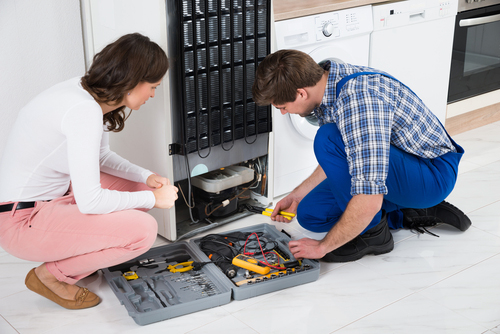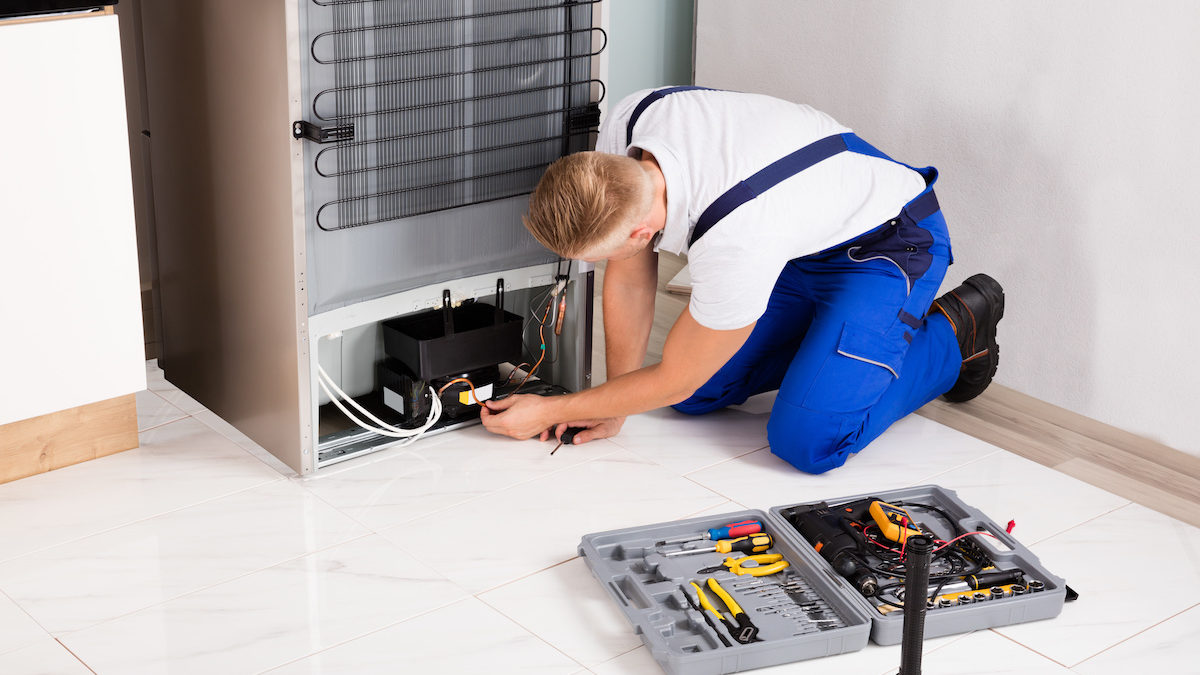Vital Tips for Effective Ref Repair Service to Expand Appliance Lifespan
When it comes to your fridge, proper repair and maintenance are essential for durability. Recognizing usual problems and knowing when to act can make all the distinction.
Recognizing Common Refrigerator Problems
Refrigerators are crucial in maintaining your food fresh, yet they can encounter a variety of common issues that interrupt their performance. One constant concern is poor cooling. If you observe food ruining quicker than normal, inspect the thermostat setups or take into consideration if the door seals are damaged. One more typical issue is extreme sound, which might indicate a malfunctioning compressor or a failing fan. You might additionally experience water pooling inside or beneath the fridge; this typically results from a clogged up defrost drain or a defective water line. Furthermore, if your fridge's light isn't functioning, it can be an easy bulb problem or an issue with the door button. Ice accumulation in the freezer can prevent air movement and cooling down efficiency. Acknowledging these concerns early can save you money and time out of commission, guaranteeing your refrigerator runs efficiently and effectively.
Normal Maintenance Practices
To maintain your appliances running smoothly, you require to remain on top of normal upkeep methods. Clean the condenser coils, check the door seals, and check the temperature settings to ensure peak efficiency. These simple tasks can conserve you money and time on repairs down the line.
Clean Condenser Coils On A Regular Basis
Cleaning your condenser coils consistently can greatly enhance your appliance's efficiency. Dirt and dirt develop up on these coils with time, causing your appliance to function more challenging and consume even more power. To maintain them clean, unplug your appliance and carefully remove any safety covers. Utilize a vacuum cleaner with a brush accessory or a soft brush to delicately remove particles. If required, a mix of warm water and mild cleaning agent can aid eliminate stubborn gunk. Make certain to allow everything completely dry totally before reconstructing and plugging the device back in. Purpose to cleanse your coils at the very least two times a year, or regularly if you have family pets or reside in a dusty atmosphere. This easy task can extend the lifespan of your home appliance considerably.
Examine Door Seals
3 easy actions can aid you assure your home appliance's door seals remain in excellent condition. Initially, check the seals frequently for any cracks, rips, or signs of wear. These damages can lead to air leaks, impacting effectiveness. 2nd, tidy the seals using warm, soapy water to get rid of any kind of particles or grime. A clean seal guarantees a tight fit and better efficiency. Lastly, execute an easy examination by shutting the door on an item of paper. If you can easily draw it out without resistance, the seal could require changing. By adhering to these actions, you'll maintain your home appliance's effectiveness and durability, saving you money on power costs and fixings in the lengthy run.
Display Temperature Settings
Regularly checking your device's temperature settings is vital for finest performance and effectiveness. Whether you're taking care of a refrigerator, fridge freezer, or oven, watching on these setups can protect against lots of issues. For fridges, purpose for temperature levels in between 35 ° F and 38 ° F; for freezers, stick around 0 ° F. If the temperature levels are expensive or low, your device might work harder, wasting power and reducing its lifespan. Make use of a thermostat to inspect these setups regularly, specifically after major modifications, like moving your appliance or readjusting the thermostat. If you discover changes, adjust the settings as necessary and consult the customer handbook for guidance. By staying proactive about temperature tracking, you'll guarantee your home appliances run efficiently and last longer.
Repairing Cooling Issues
When your refrigerator isn't cooling properly, it can cause spoiled food and squandered money, so addressing the problem quickly is critical. Start by inspecting the temperature level setups to verify they're at the suggested degrees, generally around 37 ° F for the refrigerator and 0 ° F for the freezer. If the settings are right, check the door seals for any kind of voids or damage; a malfunctioning seal can permit this article cozy air to get in.
Following, examine the vents inside the fridge and freezer. Confirm they're not blocked by food products, as this can interrupt airflow. Listen for the compressor; if it's not running or making uncommon sounds, it might require attention. Finally, check the condenser coils, typically located at the back or bottom of the unit. Dust and debris can accumulate, causing cooling concerns. Clean them with a vacuum cleaner or brush to enhance performance. If troubles continue, it could be time to call a specialist.
Repairing Water Leakage and Ice Accumulation
If you're managing water leakage or ice build-up in your home appliance, it's important to determine the source of the trouble. By determining where the water is originating from, you can protect against more problems and stay clear of pricey repair services. Let's discover some efficient methods to deal with these common troubles.
Determine Leak Resources
Just how can you efficiently identify the sources of water leakage and ice accumulation in your appliances? Start by evaluating the seals and gaskets on your refrigerator and fridge freezer doors. A worn or damaged seal can permit warm air to get in, causing condensation and ice. Next off, check the drain frying pan and drainage system for blockages or clogs; a backed-up drain can cause water pooling. Seek any loosened links in the water system line, which can create leakages. Examine the defrost drain for ice buildup, which could disrupt appropriate water drainage. By systematically inspecting these locations, you'll determine the resource of the problem, enabling you to take the necessary steps to repair it and prolong your device's lifespan.
Avoid Ice Formation
To stop ice formation in your devices, beginning by validating the temperature level setups are ideal. If your fridge or freezer is as well chilly, it can cause extreme ice accumulation. Examine the door seals on a regular basis; harmed seals can allow warm air in, causing condensation and ice formation.
Keep the appliance well-ventilated and stay clear of congestion, as this can block airflow - Best Appliance Repair Near You Dependable Refrigeration & Appliance Repair Service. Consistently defrost your freezer if it doesn't have an automatic defrost attribute.
If you notice water leakage, recognize and repair any type of blocked drain openings, as they can contribute to ice buildup. Tidy the coils and confirm they're functioning appropriately to maintain peak efficiency. Taking these actions will help expand your home appliance's life-span and effectiveness.
Resolving Noisy Fridge Appears
While it could appear worrying, a noisy fridge commonly signifies minor concerns instead of significant breakdowns. Determine the resource of the sound. Common perpetrators consist of the compressor, fans, and water lines. If you listen to a buzzing audio, it might be the compressor striving; this can simply be a normal operation audio.
Next, look for loosened things inside. In some cases, containers or racks can rattle, developing unwanted noise. Tighten or rearrange them to remove the audios.
If you notice a clicking noise, it may be the defrost timer. This is normally harmless but might suggest it requires examination.
Finally, verify your fridge is level. An unbalanced appliance can create resonances and sound. Make use of a level to check, and readjust the feet if needed. Attending to these concerns without delay can aid preserve your fridge's performance and lengthen its lifespan.
When to Change Components vs. Complete Substitute

Nevertheless, if your appliance is older and experiencing several issues, a complete substitute could be a lot more cost-effective. Think about the expense of repairs versus the home appliance's worth. If repairs surpass 50% of a brand-new unit's cost, it's usually smarter to purchase a replacement. Additionally, if you discover recurring troubles that keep repeating, it's an indicator that your home appliance has actually gotten to completion of its life. Weigh these elements very carefully to make the most effective decision for your requirements and budget plan.
Recognizing When to Call a Professional
How can you tell when it's time view to call in a professional for appliance repair? If your device quits working entirely or frequently trips circuit breakers, it's an additional red flag.
You must also consider your own convenience degree with repair work. If you're unsure about identifying the trouble or do not have the right tools, it's best to connect for help. Remember, attempting challenging repairs can bring about even more damages or perhaps security dangers.

Frequently Asked Inquiries
How Commonly Should I Clean the Fridge Coils?
You need to clean your fridge coils every six months. This helps maintain efficiency and prevents overheating. If you see extreme dirt or pet hair, clean them extra often to guarantee your fridge runs efficiently.

Can I Use Vinegar for Cleaning My Refrigerator?
Yes, you can make use of vinegar to cleanse your refrigerator! It's an excellent all-natural cleanser that removes odors and spots. Best Appliance Repair Company In Oro Valley Dependable Refrigeration & Appliance. Just mix it with water, apply it to surfaces, and clean down for a fresh, tidy refrigerator
What Temperature level Should My Refrigerator Be Set To?
You ought to set your refrigerator to 37 ° F(3 ° C) for perfect food preservation. This temperature keeps your food fresh while avoiding putridity, ensuring your groceries last longer and reducing waste. It's a very easy change you can make!
Does a Fridge Need to Be Leveled?
Yes, your refrigerator needs to be leveled. If it's unequal, it can impact cooling efficiency and create excess sound. Inspect the progressing legs and adjust them to guarantee proper equilibrium for excellent performance.
Exactly How Can I Reduce Fridge Energy Consumption?
To decrease your refrigerator's power usage, maintain it tidy and well-ventilated, examine door seals for leakages, set the temperature in between 35-38 ° F, and prevent overloading it. These actions can substantially reduce your energy costs.